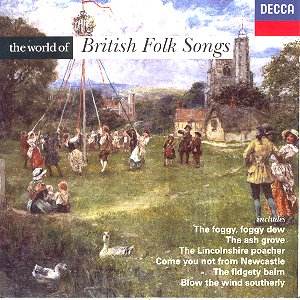The World of BRITISH FOLK SONGS
1. The foggy, foggy dew*
2. Early one morning*
3. The ash grove*
4. The Lincolnshire poacher*
5. Ma bonny lad**
6. I know where I'm going**
7. O Waly, Waly***
8. The keel row**
9. A brisk young widow*
10. Sweet Polly Oliver*
11. The minstrel boy*
12. Come you not from Newcastle* |
13. Whittingham Fair*****
14. The Blaydon Races******
15. The cliffs of old Tynemouth******
16. Ca' the yowes*
17. The plough boy*
18. Kitty, my love***
19. The stuttering lovers**
20. I have a bonnet**
21. Drink to me only**
22. My boy Willie**
23. The fidgety bairn****
24. Blow the wind southerly**** |
 Peter Pears (tenor), Benjamin
Britten (piano)* Kathleen Ferrier** *** **** (contralto), Phyllis Spurr**
(piano), Frederick Stone*** (piano, John Newmark**** (piano) Owen Brannigan*****
****** (bass), Orchestra conducted by George Clouston***** or Max
Harris******
Peter Pears (tenor), Benjamin
Britten (piano)* Kathleen Ferrier** *** **** (contralto), Phyllis Spurr**
(piano), Frederick Stone*** (piano, John Newmark**** (piano) Owen Brannigan*****
****** (bass), Orchestra conducted by George Clouston***** or Max
Harris******
Rec October 1959, November 1961, Kingsway Hall, London
February 1949, July 1950, December 1951, Decca Studios, West
Hampstead
December 1951, BBC Concert Hall, London
June 1952, BBC Concert Hall,
London
 DECCA 467 782-2
(60.53)
DECCA 467 782-2
(60.53)
Crotchet AmazonUK
AmazonUS

This collection includes many of the best loved British folk songs, in recordings
made between 1949 and 1961. These have been remastered with much success.
The quality of sound is generally pleasing and in the more recent examples,
sung by Peter Pears with Benjamin Britten, it is a great deal better than
that. So the combination of famous folk songs sung by famous performers has
an immediate appeal. However, the most recent of these performances is now
forty years old, and the style of delivery sometimes seems dated.
The oldest recordings, dating from 1949 to 1952, are by Kathleen Ferrier.
Her distinctive voice is captured with full tone and clarity, but her
accompanists fare less well, tending to be placed in a kind of aural fog
in the middle distance. Also, there are occasional hints of pre-echo in the
vocal recording.
The recordings for Peter Pears and Benjamin Britten, on the other hand, offer
vintage Kingsway Hall Decca sound, and in these songs the full benefit of
Britten's piano accompaniments can be experienced. For these are his own
arrangements, sensitively responding to the nature of each song, and as such
they are generally closer to the spirit of the basic material than the earlier
arrangements performed by Ferrier and Owen Brannigan.
Brannigan has an orchestral accompaniment, well enough performed by a nameless
ensemble on a nameless recording date. From the sound quality, the early
1950s would seem a fair bet. Brannigan sings three songs from the north-east,
and he goes out of his way to deliver them in an 'authentic' accent, to the
extent that his performances seem somewhat mannered. The stilted delivery
of Whittingham Fair simply gets in the way of the beautiful contour
of the tune. With such a fine voice, he would surely have been better advised
to let the music speak for itself more naturally.
And perhaps that is the point at issue in the whole collection. The three
singers featured here all have what might be termed 'strong personalities'
- their voices are instantly recognisable. As a result, the performances
are never dull. But equally they are very much 'interpretations' and not
definitive statements.
This collection offers the listener an interesting experience, but stylistically
it must now be viewed as something of a period piece. The real beauty of
folk songs lies in their very directness and simplicity, in which sense it
is Pears and Britten who come closest to the heart of the matter.
Terry Barfoot

